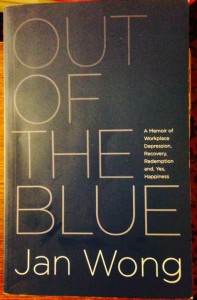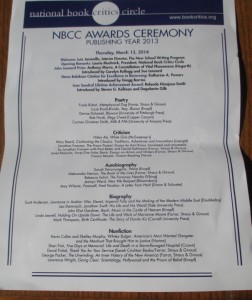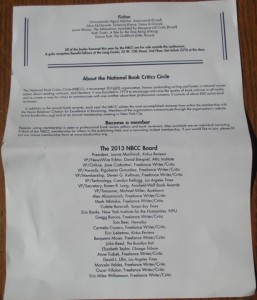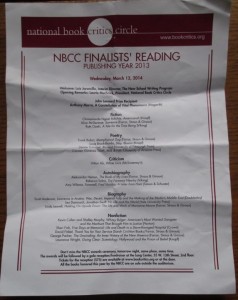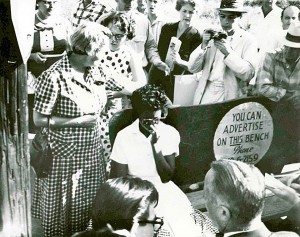#FridayReads, March 21–Jan Wong’s Engrossing Memoir of Surviving Depression, “Out of the Blue”
April Update: Jan Wong has suffered a new legal setback in her long-running battle with her former employer, the Globe & Mail newspaper. She had chronicled the breakdown of her employment in her gripping 2012 memoir Out of the Blue. Wong may have thought it was permissible to write about the settlement they agreed to, while not mentioning its actual amount. She wrote that the paper had paid her “a pile of money to go away,” and “a big fat check landed in my account.” The Globe & Mail claimed the confidentiality clause in their agreement had been violated and sued successfully for return of the money. Ironically, that has resulted in the disclosure of the settlement, $209,000, something the paper claimed they did not want to be revealed. I guess you could say that their vindictiveness came back to bite them. More recently, Wong appealed the initial ruling, which has now been upheld by a judge in Toronto. Wong was intemperate, but she surely delivers a better fate than to lose her settlement. According to this article, she may have one more appeal left to her.
—-
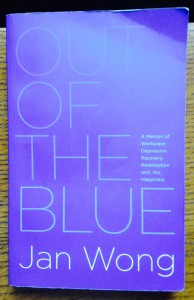 Beginning last week when I made Out of the Blue my #FridayReads for March 14, I spent much of the past week reading and being enthralled by Jan Wong’s scalding memoir of surviving a severe depression that was triggered when an article she’d reported and written became controversial. Her employer at the time, the Toronto Globe & Mail, utterly failed to support her as as the article, about a mass shooting in Montreal, blew up over several weeks and months, even though her editor had praised the approach Wong took to the story, which while reporting on the tragic incident also considered the role that the multilingual province’s ethnic politics may have played in the tragedy. Wong’s editor had even asked her to push this aspect of it further. As she began getting death threats and vile messages, the Globe & Mail hung her out to dry, implicitly criticizing her and pandering to the haters arrayed against her. Wong tells her story in the first person, a compelling narrative that follows the course of her struggle for fair treatment by her employer, and the torturous path of her illness, with records she later got from the insurance company that tried to deny her disability claims for what should have been regarded as a workplace injury.
Beginning last week when I made Out of the Blue my #FridayReads for March 14, I spent much of the past week reading and being enthralled by Jan Wong’s scalding memoir of surviving a severe depression that was triggered when an article she’d reported and written became controversial. Her employer at the time, the Toronto Globe & Mail, utterly failed to support her as as the article, about a mass shooting in Montreal, blew up over several weeks and months, even though her editor had praised the approach Wong took to the story, which while reporting on the tragic incident also considered the role that the multilingual province’s ethnic politics may have played in the tragedy. Wong’s editor had even asked her to push this aspect of it further. As she began getting death threats and vile messages, the Globe & Mail hung her out to dry, implicitly criticizing her and pandering to the haters arrayed against her. Wong tells her story in the first person, a compelling narrative that follows the course of her struggle for fair treatment by her employer, and the torturous path of her illness, with records she later got from the insurance company that tried to deny her disability claims for what should have been regarded as a workplace injury.
The setting is mostly Toronto and Montreal, where Wong’s father had long owned a Chinese restaurant, and whose business fails when Wong’s reputation suffers amid the controversy. She travels a lot in the course of her narrative, even while she’s ill, for what she and her medical providers hope will be a “geography cure.” She goes to Finland with her son for a hockey tournament, and travels with her stalwart sister to Paris. As an alum of the Columbia Graduate School of Journalism, Wong also visits New York City and the Columbia campus, near where I happen to live. The Globe & Mail tries to make an issue of her ability to travel, while she’s unable to work, failing to recognize that it was their careless treatment of her in the newsroom that had triggered her illness, which was continually re-injuring here.
She pays sincere homage to her predecessors in the field of depression memoirs–William Styron, Andrew Solomon, and Kay Redfield Jamison–quoting strategically from their books. She also laments something I’ve written about on this blog, in the context of my own departure from Sterling Publishing in 2009, “the baleful influence that today’s HR mindset casts on our culture, full of its own hermetic vocabulary, with bland euphemisms, opaque acronyms, and inhumane doublespeak. Shunning and banishment are two of the signature modes of behavior in this modern HR culture.” Wong experienced this far worse than I ever did. And yet, it would be wrong to paint the book too bleakly. Despite being unable to write for most of the two years, and suffering huge losses in cognition and her social comfortability, I was conscious while reading the book that she’s writing it from a post-depression standpoint. Amazingly, she also manages to inject mordant humor in to the tale, as she portrays some of her managers and the contortions they took to deny how sick she was.
To top it all off, there’s also a triumphant backstory to the publication of the book, which came out in 2012. Out of the Blue has done well, with many recognitions and healthy sales, and yet she was forced to publish it herself after Doubleday Canada canceled it shortly before the manuscript was going in to copyediting. They evidently became uneasy over the legal climate around the book, since Wong, the Globe & Mail, and their insurer had had so many legal battles during the course of her ordeal. I read a lot of first-person literature, and this is one of the best examples of it I’ve read in a long time.

